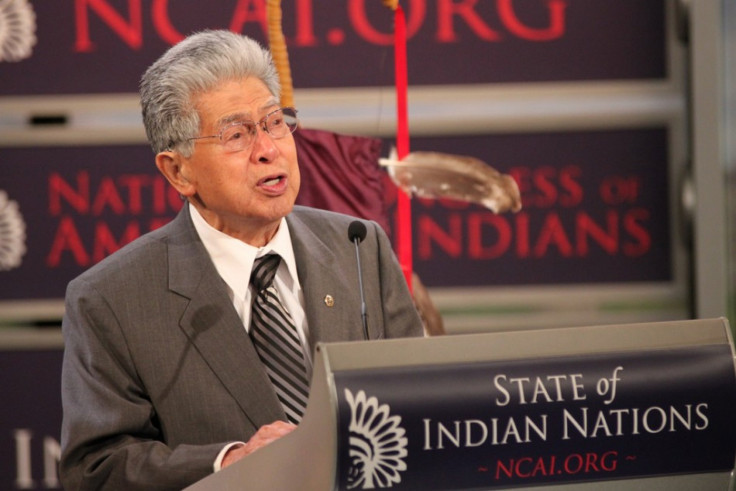Akaka's Retirement: Native Hawaiians To Lose Advocate In Washington
ANALYSIS

Sen. Daniel K. Akaka, D-Hawaii, will retire from the U.S. Senate this year, marking the end of his 35 years in Congress.
Akaka, 87, served 13 years in the House of Representatives before his 22 year-long career in the Senate, where he is the only Native Hawaiian. As a longtime advocate for greater federal recognition of Native Hawaiians, his departure could prove worrisome for indigenous rights in the United States.
Hawaii's natural beauty makes it a legendary travel destination, yet most Americans and many in Washington are unaware of the very real issues that the people of Hawai'i face. Among the most troubling is the widespread disenfranchisement of Native Hawaiians in their own homeland.
Nearly 20 percent of Native Hawaiians and other Pacific Islanders in the state live in poverty, according to a 2010 White House report. Indeed, Native Hawaiian families have the lowest mean family income of all major ethnic groups in the state of Hawaii, according to a report published by Kamehameha Schools.
Adding to the problem is the fact that the U.S. has not recognized Native Hawaiian rights to self-determination as an indigenous people, as it has with 565 Indian tribes in the 48 contiguous states and the natives of Alaska.
Akaka has long made it his mission to change that, but his time is almost up. Sadly, Native Hawaiians will lose their champion in Washington this year, something that should worry all Americans.
Despite his many congressional successes and widespread support in his home state, Akaka's retirement will be tinged with a sense of failure. After many attempts, the veteran lawmaker's signature piece of legislation has never been put up for vote in the Senate.
The Native Hawaiian Government Reorganization Act, known as the Akaka Bill, was first introduced by Akaka and co-sponsored by his colleague Sen. Daniel Inouye, D-Hawaii, in 2000. The bill has been submitted in both the House and Senate in various forms since. It has passed three times in the House and cleared the Senate Committee on Indian affairs on seven occasions.
If passed, the bill would recognize Native Hawaiians as a self-governing people, the same recognition that Native Americans and Alaska Natives have long enjoyed. After this is achieved, the bill calls for negotiations between a Native Hawaiian authority and the United States as coequal entities.
Federal recognition would simply put the state of Hawaii on equal footing with the rest of the country in the treatment of its indigenous peoples. The people of Hawaii have waited far too long for an opportunity to participate in a government-to-government relationship similar to that already extended to this nation's other indigenous people, Akaka says on his website.
The Akaka Bill seeks to further the provisions of U.S. Public Law 103-150, better known as the Apology Resolution, which was signed into law by President Bill Clinton in 1993. In essence, the resolution apologized for the United States' role in the overthrow of the Kingdom of Hawaii in 1893. Furthermore, it recognized that the natives never relinquished their inherent claims to sovereignty.
In the resolution, the United States apologized for its involvement, and acknowledged the ramifications of the overthrow. And it committed to support reconciliation efforts between the United States and the Native Hawaiian people. However, additional congressional action is needed, Akaka stated in his introduction to the latest version of the bill in 2011.
Opponents have spread misinformation about the bill, he added. Let me be clear on some things that this bill does not do. My bill will not allow for gaming. It does not allow for Hawaii to secede from the United States. It does not allow for private land to be taken. It does not create a reservation in Hawaii.
Despite these assurances, the Akaka Bill has faced opposition on several fronts since its inception.
The George W. Bush White House, Republicans in the House and the Senate, and the U.S. Commission on Civil Rights have opposed the proposed legislation on the grounds that it would create a race-based government. The constitutionality of the bill is also questioned by conservative groups like the Cato Institute.
Former Hawaii Gov. Linda Lingle, a Republican who is now running for Akaka's Senate seat, voiced disapproval of the bill in its 2010 form based on a provision that would accord powers to a future Native Hawaiian government entity prior to negotiation with the U.S. government and the State of Hawaii.
Some Native Hawaiian advocate groups have stated opposition as well, believing the Akaka Bill would hinder the creation of a fully sovereign Hawaiian state that could secede from the U.S.
Criticism aside, a majority of Hawaii residents and Native Hawaiians themselves are in favor of what the Akaka Bill seeks to accomplish. A 2010 poll conducted by the Honolulu Advertiser showed that 66 percent of state residents polled were in favor of Native Hawaiians being recognized by Congress and the federal government as a distinct group, similar to the special recognition given to American Indians and Alaskan Natives. Native Hawaiians responded 88 percent in favor.
Proponents of the bill include the Obama administration, current Gov. Neil Abercrombie, the entire Hawaii congressional delegation, the Hawaii State Office of Hawaiian Affairs, the American Bar Association and the National Congress of American Indians.
It is unlikely that the bill will be passed before Akaka's retirement, and it is uncertain if it will be reintroduced in his absence next year.
In the event that the Akaka Bill leaves with its author, Native Hawaiian concerns will fall even further by the wayside in Washington politics.
© Copyright IBTimes 2024. All rights reserved.





















